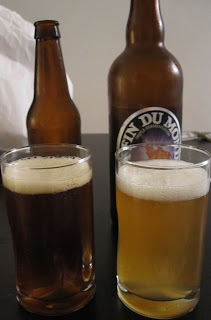Hard Lemonade!
So I've previously mentioned wanting to do an experimental Hard Lemonade - and tomorrow an attempt I anticipate will be quite successful shall be bottled. Nearly a decade ago my friend Ben and I attempted a hard lemonade in Reed's dorms and it was a spectacular failure. It was quite disappointing - I made a large batch of lemonade following my mom's recipe (as best I could recall) which involved real lemons, and boiling of the zest and all that - only to have gallons of unfermentable too-sweet lemonade. Why exactly it did not ferment is still a subject of some debate. The high acid content of lemonade is frequently cited as the culprit, but (especially in light of the latest success) I'd venture it was a combination of poor nutrient availability and poor aeration.
Having had ten years to reconsider how to go about fixing this I had decided that I would include a small amount of light malt extract and a proportionally large amount of yeast nutrient in the mix with lemonade and corn sugar to try to compensate for the relatively nutrient-poor lemonade. Here's the ingredients:
Yeast Starter: 200 ml (50% lemonade 50% water) with 14 grams light dry malt extract. Yeast (Lalvin EC-118) added at 90 degrees.
Primary Fermentation:
- 7x 32oz Bottles of Whole Foods Lemonade
- 200 grams light DME
- 500 grams corn sugar
- 1 tsp Wyeast yeast nutrient
I used three or four of the bottles to heat gently, below boiling, the DME and corn sugar and yeast nutrient to pasteurize, then mixed that with the rest of the bottled lemonade in the primary fermenter. After a couple hours I mixed in the actively bubbling starter.
When Becky and I returned from dinner several hours later I was quite pleased and relieved to see Tubby bubbling away, indicating the fermentation of the lemonade had been successful. Fermentation continued briskly for several days and tapered off after a week.
So, the actual fermentation of the lemonade, the conversion of the sugars to alcohol, was successful - and for just that I'm quite pleased. Whether this proves to be palatable at all remains to be tasted. One concern is the amount of stevia or other unfermentable sweetener that may be required will bring with it too much of that artificial sweetener taste.
Soon I will report back on the taste outcome!


Comments
Post a Comment